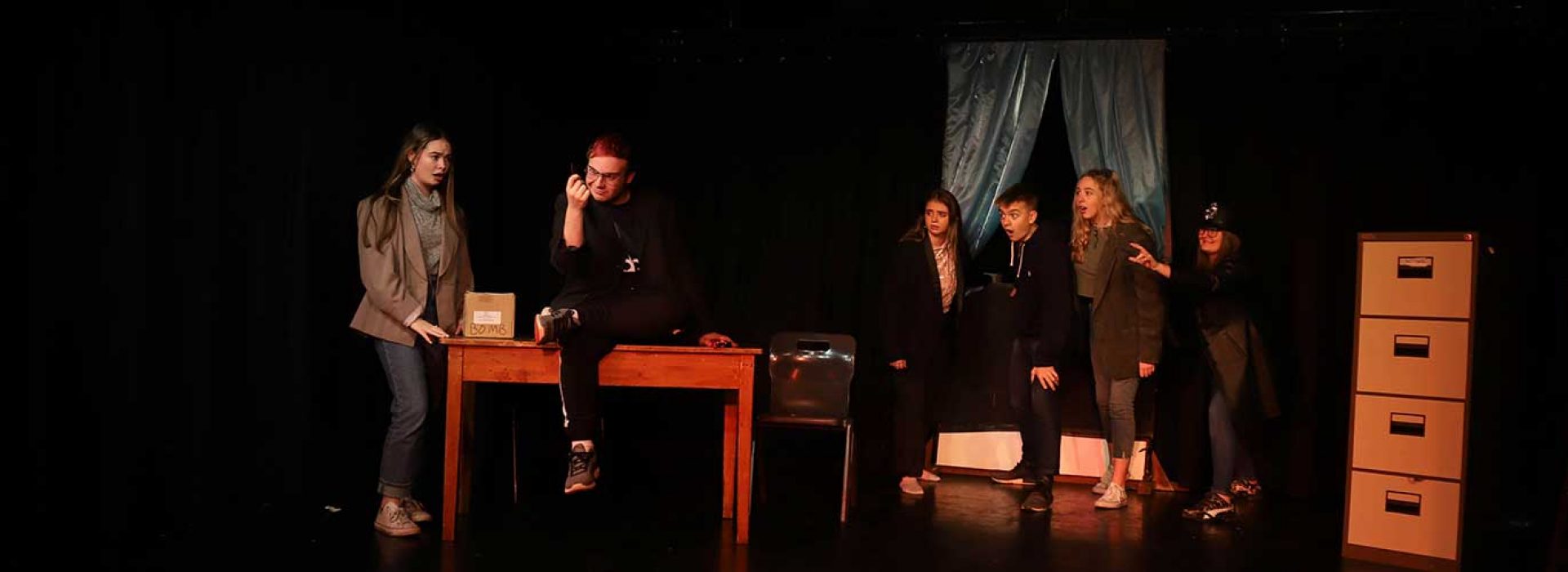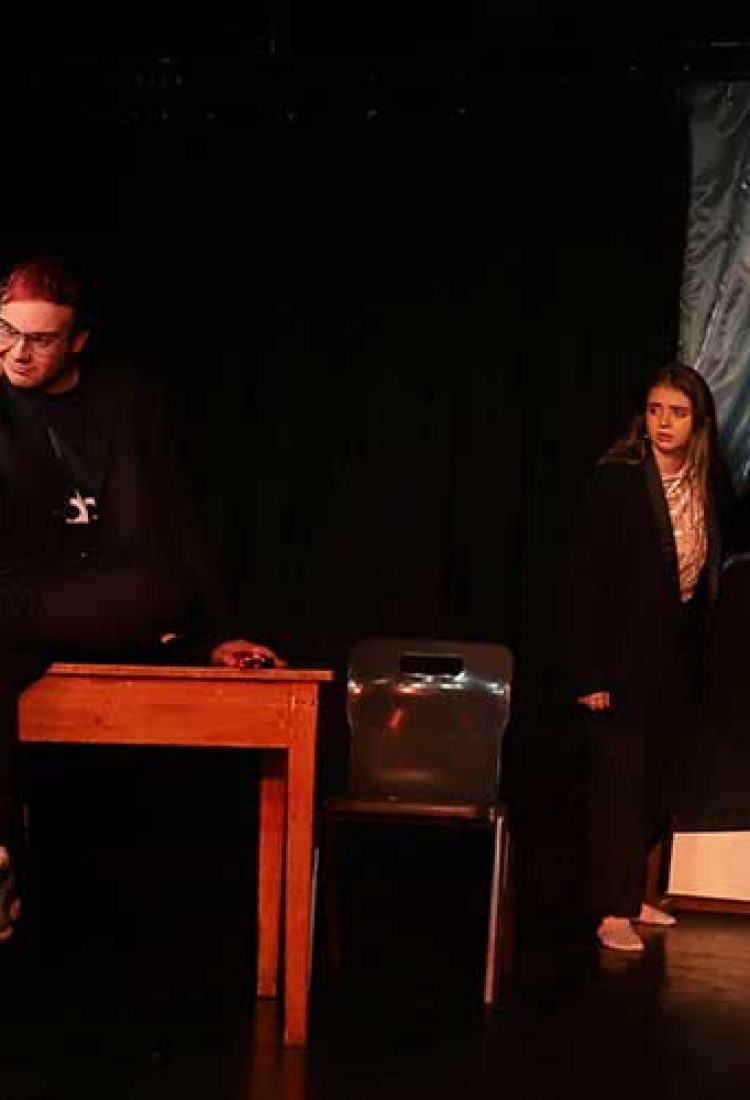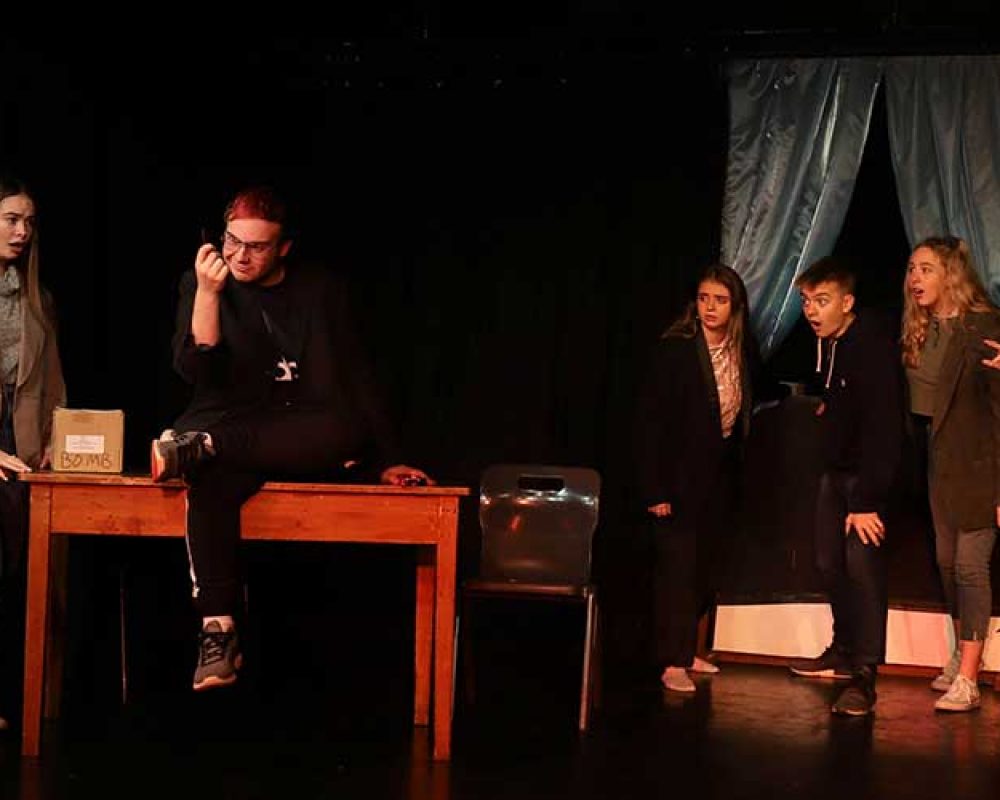Head of Department: Mrs K Chatfield
Department team:
- Mrs C Cowell
- Miss J Sullivan
Drama is integral for communicating with others, both in school and in the wider world. We want students to have access to a broad and ambitious Drama curriculum, which embeds skills and knowledge of theatre and performance, whilst further developing their passion for the Arts. Drama promotes empathy, equality, self esteem, self confidence and communication; it can enable all students to access the curriculum through practical tasks. We strive to get students to explore social issues, topical events and cultural differences through the means of Drama. Introducing them to various plays, playwrights and practitioners, whilst using relevant stimuli to create practical work from. Through written work we aim to develop students’ analysis and evaluation skills, which can then be used across many subjects. Drama can help create independent learners, critical thinkers and effective decision makers, all personal attributes that can make them stand out as they progress through their education and into employment.

We actively promote SMSC through our Drama Curriculum and believe that it is complementary to our aims.
Spiritual: Students regularly reflect about their own beliefs through discussion and written work. They also develop their imagination and creativity in gaining understanding of the different roles they play. Considering how that person feels, thinks and behaves.
Moral: The nature of the subject allows for this to be at the forefront for all year groups, ensuring discussions and teaching looks at various moral situations and asks students to consider how they feel about them and to gain an understanding of others morals and views..
Social: Students work together in a multitude of groups across the years, developing their teamwork and interpersonal skills and an acute awareness of how others work.
Cultural: Across all years students are made aware of various cultures through the different forms of theatre that we study.
At Churston we strive to ensure that all students get a chance to access Drama whether they opt at GCSE and above or not. We run a yearly whole school production, involving any student who wants to be part of it. As well as the option to pay for and attend LAMDA lessons.
Mrs Kay Chatfield, Head of Drama
What we do
At its heart Drama is an academic subject which requires a level of understanding of literature, language and the human condition. It practically explores a variety of ways of communicating ideas to an audience in a creative format, whilst honing the presentation skills of the individual. Drama is a group based, presentational subject and thus helps students refine key employability skills. Drama covers the team work, communication, presentation, and problem solving skills which are so essential in the world of work. These skills are valuable in a range of careers, not just those in the Arts.
In studying drama at Churston, students will develop skills in acting, speaking, listening, reading and writing. These skills will be integral to their development within the wider world and future employment. Students learn to express themselves creatively and imaginatively and to communicate with others confidently and effectively. We develop students’ verbal and nonverbal expression of ideas through improving their voice projection, articulation of words, fluency with language, and persuasive speech.
Aims and learning outcomes in Drama will encourage learners to:
- Explore performance texts, understanding their social, cultural and historical context including the theatrical conventions of the period in which they were created.
- Develop a range of theatrical skills and apply them to create performances.
- Work collaboratively to generate, develop and communicate ideas.
- Develop as creative, effective, independent and reflective students able to make informed choices in process and performance.
- Contribute as an individual to a theatrical performance.
- Reflect on and analyse and evaluate their own work and that of others.
- Prepare students for the further study of Drama or Performing Arts courses as well as developing transferable skills desired by higher education and employers in all sectors of the industry.
- Allow learners to explore their own interests and develop their skills in either performance or design routes. These options provide an element of freedom for learners to experiment and take risks with their work while developing their own style.
Year 7 | Year 8 | |
|---|---|---|
Autumn 1 | ‘New Beginnings’ - Understanding a new subject/working environment, introduction to key skills linked to GCSE spec. Skills -Facial Expressions. Body Language. Still Images. | ‘Perseus and Medusa’ - Exploring Greek Theatre and timeless moral themes. Skills - Still Images, Physical Theatre Narration, Physical/Vocal Skills, Cross Cutting, Thought Tracks. |
Autumn 2 | ‘New Beginnings’ - Exploring personalities, Bullying, Friendships Skills - Comedy, Exaggerated Physical/Vocal Skills, Chorus Work, Addressing the Audience (breaking the 4th wall) | ‘Twelfth Night’ Exploring - Shakespeare’s Comedy through characterisation. Skills - Characterisation, Interpretation of original texts, thought tracking, still images, physical/vocal skills |
Spring 1 | ‘Ernie’s Incredible Illucinations’ - Exploring a script & learning how they are constructed. Skills- Roleplay, Narration, Vocal and physical skills, monologues. | ‘Curious Incident of the Dog in the Nighttime’ - Understanding Autism Modern theatre styles in performance. Skills - Script work, Physical Theatre, Hot seating, Characterisation |
Spring 2 | ‘Physical Theatre’ - Using Stimuli to create images/movements. Skills - Physical Theatre, Group work | ‘Commedia Dell'arte’ - Exploring 18th Century Italian Theatre and Theatre HIstory. Skills - Comedic Physical Theatre, characterisation, devised and spontaneous improvisation for devising skills |
Summer 1 | ‘Macbeth’ - Shakespeare’s language & universal themes of power. Skills - Role play, script as stimulus for improv, movement skills, monologues, soundscapes | ‘Cyber Bullying/use of social Media’ - Building awareness to the roles of a bystanding, victim and perpetrator & being careful online. Skills - Hot seating, role play, thought tracking, characterisation |
Summer 2 | ‘House Drama’ - Celebration through Collaboration. Skills - Devising and amalgamating all skills learnt through the year. | ‘Diversity - Civil Rights’ - Exploring the Movement and injustice, Civil Rights, Race, Equality. Skills - Still Images, Physical Theatre, Narration, Physical/Vocal Skills, Cross Cutting, Thought Tracks - all to symbolise current and historical injustice. |
Links
We actively get students to consider the different career options available to them. Whilst studying set texts and theatre productions, students are asked to consider the many roles, ranging from actors and directors to designers and stage hands. We also link to careers through our annual productions, allowing students to take on many leadership roles within different areas of theatre production, including lighting, sound and set design. As well as giving students the opportunity to gain an understanding of careers in the Arts, we provide them with many transferable skills, which can be applicable to all types of job roles.


